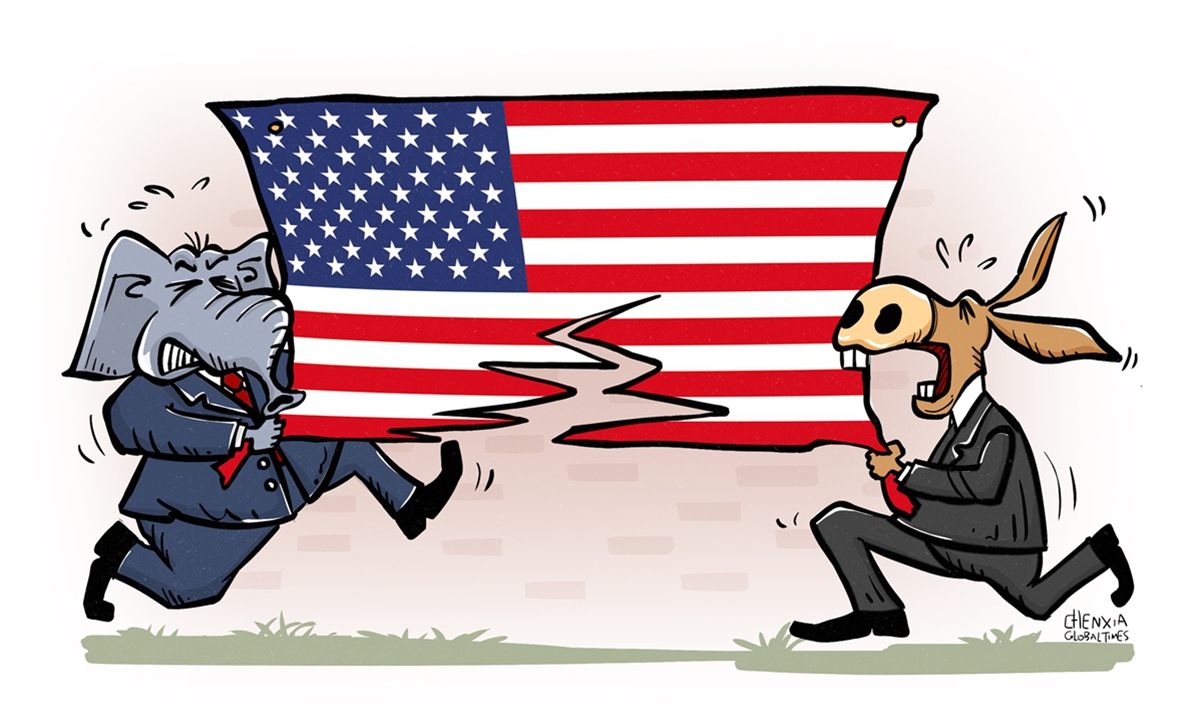The world's most uncertainty: unpredictable course of American politics

Illustration: Chen Xia/Global Times
Amid a heavy snowfall blanketing the state of Iowa, the US 2024 presidential election cycle commenced with its first votes on Monday evening. The results heralded a victory for former president Donald Trump, who achieved a "landslide" triumph over his competitors.
This marked the initial victory in Trump's campaign to secure the Republican nomination and boosted his confidence in reclaiming the presidency in November's national election.
The irony is that the candidate who arguably contributed to global uncertainty now vows to resolve it.
Undoubtedly, Trump and his campaign will continue to rally support with their combative approach. Whether Trump will secure the Republican nomination remains a question, but it is these very uncertainties that add a layer of suspense to the unfolding political drama.
It has been three years since the Capitol Hill riot, an event that continues to exacerbate the divide in American politics, leaving political analysts anxious about the potential for violence in the electoral process. Colorado and Maine have already declared Trump ineligible for the 2024 presidential primaries within their borders. Can these states impede his candidacy?
On March 4, Trump is scheduled to stand trial on federal charges of attempting to overturn the results of the 2020 presidential election. The following day, "Super Tuesday," will see Republican primaries in more than 15 states. Will these events affect Trump's momentum?
Globally, the stakes are high, with the situation in Gaza, the Russia-Ukraine conflict and the Red Sea crisis, among others - all intricately linked to the US elections and potentially impacted by its outcome.
The EU, a significant ally of the US, has long cast a wary and distrustful gaze upon Trump. EU Commissioner for Internal Market Thierry Breton, referenced a conversation from 2020 between Trump and European Commission President Ursula von der Leyen, where Trump suggested that the US might not protect Europe if it were attacked. Breton's reminder serves as a nudge to the precariousness of the transatlantic relationship.
Even Christine Lagarde, president of the European Central Bank, who typically refrains from political commentary, expressed concern during an interview with France 2 TV, suggesting that Trump's potential re-election poses an apparent threat to Europe, based on his policies during his presidency.
The world watches in silence and prepares for change.
In China, nowadays, Chinese people generally watch the US elections as a form of entertainment. No matter who comes to power in the US, China is well-prepared for the future trajectory of China-US relations. If Trump is elected, the moves he might make are largely anticipated. However, as the initiator of the trade war with China, it's generally believed Trump's potential comeback could further complicate China-US relations.
We are stepping into an era of turmoil, disorder and change, where the most certain aspect is the US' continued dominance in many global spheres. Yet, it is the political evolution of this very nation that stands as the world's most uncertain factor, with reverberating consequences that will shape the international landscape for years to come.
The author is a senior editor with People's Daily, and currently a senior fellow with the Chongyang Institute for Financial Studies at Renmin University of China. dinggang@globaltimes.com.cn. Follow him on X @dinggangchina



